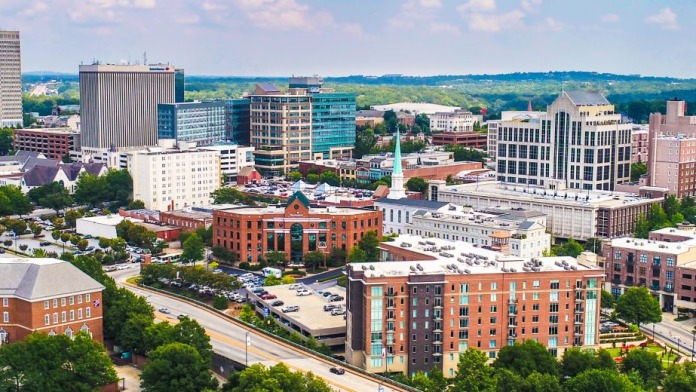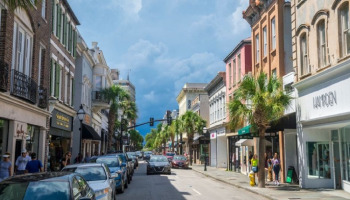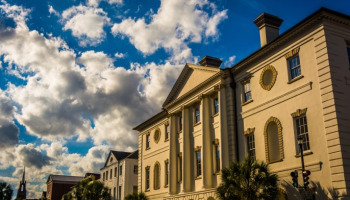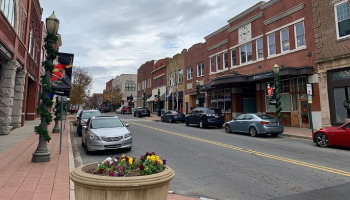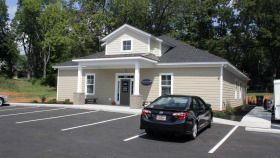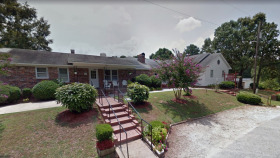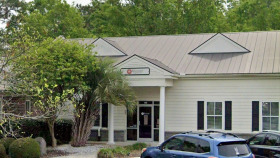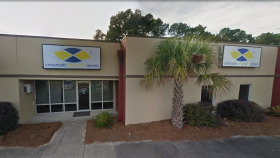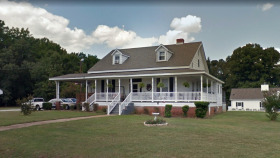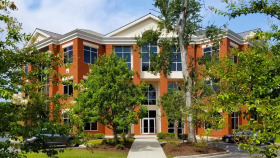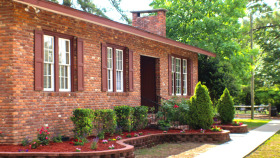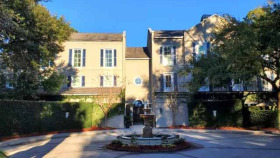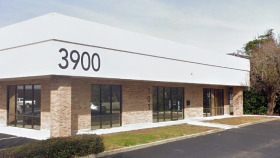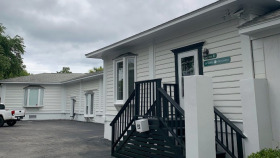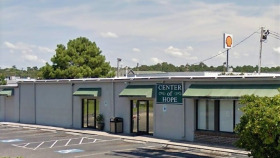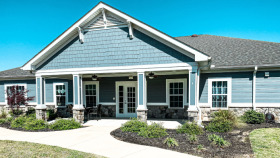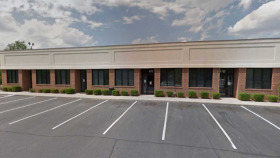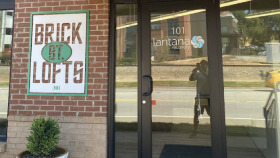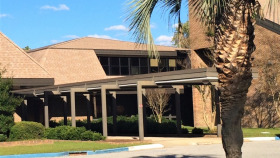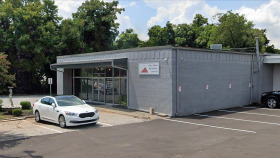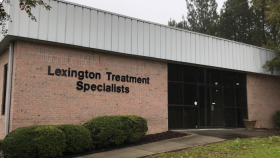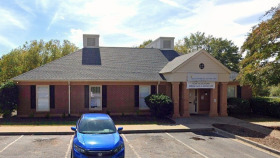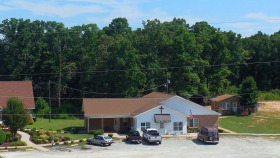Expert Insights
As a social worker, I have cared for many clients in the criminal justice system. Oftentimes, their charges are a result of being under the influence or having an extensive history of substance use.
In a lot of cases, these clients have never been given the chance to receive treatment outside of jail for their substance use or co-occurring disorders.
In South Carolina, they have started to implement different programs to help reduce recidivism and give people a chance. South Carolina’s probation and parole division offers a sentencing reform program. They also have other statewide programs that do similar things but offer different approaches both therapeutic and non-therapeutic.
It’s my hope that these programs can make a powerful difference in the lives of people who are fighting lifelong battles with addiction.
~ Geordyn Houston, LMSW
How Much Does Drug Rehab Cost in South Carolina?
South Carolina is ranked 37th nationwide in terms of addiction treatment affordability, with an average cost of drug and alcohol rehab of $57,774 (without insurance).
- Medical detox is the most expensive, with an average cost of $142,434
- Long-term inpatient drug rehab in South Carolina costs an average of $50,982
- Outpatient addiction treatment in South Carolina costs an average of $8,471
- Outpatient methadone treatment is the most affordable, with an average cost of $7,527
The cost of rehab can vary, depending on the type of rehab you choose and the facility you attend. Your out-of-pocket costs could be very high if you go to a luxury facility, or you could find a treatment program with low costs. Some things that affect rehab expenses include:
Whether you go to an inpatient or outpatient program
If the facility has luxury amenities or special services
The duration of treatment.
If your insurance plan covers some or all of the costs
Where the rehab is located
Residential rehab or inpatient rehab is usually more expensive than an outpatient program. Inpatient includes the costs of living at the facility, medical costs, as well as addiction treatment services. Outpatient programs cost less because you are only paying for therapy.
Paying for Addiction Treatment in South Carolina
Major Private Insurance Carriers in South Carolina:
- Aetna
- Allstate Health Solutions
- Ambetter /Absolute Total Care
- Blue Choice Health Plan of South Carolina
- BlueCross BlueShield of South Carolina
- Cigna Health Care of South Carolina
- Coventry Health Care of the Carolinas
- Humana
- Molina
- Select Health of South Carolina
- UnitedHealthcare
- US Health Group
- ValuePenguin
Medicaid
Healthy Connections is the name for Medicaid insurance in South Carolina. Medicaid substance abuse treatment coverage usually includes services like detox, medication assisted treatment (MAT), crisis care, inpatient or residential treatment, various outpatient options, 12 Step and faith-based programs, and LGBTQ programs.However, not all services are available at every facility.You should always check with your insurance provider to ask which facilities and programs would be covered through your specific Medicaid insurance plan, and what additional costs or copays might apply.
Medicare and Medicare Advantage
Medicare and Medicare Advantage insurance plans in South Carolina provide coverage for mental health, plus substance abuse treatment if the person is diagnosed with a substance abuse disorder (SUD). Substance abuse services vary by plan, but most often include detox, with MAT as needed, residential or inpatient care, and outpatient treatment.
Individual, group, and family counseling are covered, and medication management, along with diagnostic psychiatric evaluations or psychological assessments, may be included. But be sure you check with your insurance provider to find out the details of your plan’s addiction treatment coverage. Policies often place limits on the number of residential or inpatient hospitalization days they will cover. Fees may apply as well, such as deductibles and copays.
Military Insurance
Insurances that are typically available to active military personnel and military veterans are TRICARE insurance and the insurance benefits provided by the Department of Veterans Affairs, commonly called the VA. TRICARE covers substance abuse treatment for their members who have been diagnosed with an SUD. Covered services usually include inpatient or residential care, treatment for opioid addiction–detox and MAT–plus outpatient treatment options.
The services available vary according to individual policies. So, some services won’t be available at every facility, and some policies will have limitations on certain services, like the number of inpatient or residential treatment days covered.
The VA’s addiction and substance abuse treatment services for South Carolina military veterans are provided by the federal VA SUD program. This program offers inpatient treatment and outpatient treatment, as well as specialized opioid treatment. The services available will vary according to specific VA SUD facility locations. You can find a list of South Carolina VA clinics that have SUD programs at their state directory.
Tribal and Indigenous Peoples’ Programs
The only federally recognized American Indian reservation in the state of South Carolina is the Catawba Indian Nation. There are also members and descendants from other Indian tribes, however, especially the Cherokee, who live in South Carolina. The lower Eastern Cherokee Nation of South Carolina is recognized as a tribe by the state, but not by the federal government.
The U.S. Indian Health Service maintains just one clinic facility in South Carolina: the Catawba Service Unit in Rock Hill. They may provide substance abuse treatment. They’re an outpatient clinic that offers medical and dental treatment, and through partnerships with other community organizations, offer mental health and counseling services, including telehealth behavioral health services. You can call the Catawba Service Unit at 803-366-9090 for more information or to schedule an appointment.
Another source for mental health and substance abuse counseling for South Carolina Native Americans can be found at community mental health centers that are sponsored by the U.S. Department of Human Services. The Human Services department oversees clinics called Federally Qualified Health Centers (FQHCs) that provide services to underserved communities throughout the U.S.
These can include American Indian communities that don’t have Indian Health Service facilities. FQHCs accept Medicaid as insurance.Go to the FQHC website and use the search box to type the state’s name. This will bring up contact information for FQHC clinics located in South Carolina counties.
Other Low-Cost Options
Financial Assistance
You might be able to finance your substance abuse rehab treatment by taking out a loan from a bank, a friend, or a family member. You could also try to solicit funds on a social media platform such as GoFundMe. This online platform helps people raise money for projects or personal needs.
If you are part of a community that faces discrimination, such as a racial minority group or the LGBTQ+ community, you might be able to get funding from organizations that serve these communities. Some advocacy organizations offer scholarships to help pay for addiction treatment for individuals who’re associated with their underserved groups.
Sliding Scale Payments
Many rehab facilities offer reduced fees or sliding fee payment structures to potential clients who, without their financial help, wouldn’t be able to access treatment at their facility. If your income is below the federal poverty level, you may be able to receive the maximum fee reduction offered at a rehab facility. But remember, substance abuse rehab treatment programs vary greatly in cost.
For instance, luxury rehabs are much more expensive than state-funded facilities. So, even if you are offered a substantial fee discount, that still won’t be a guarantee that a particular rehab will be affordable for you.
Family Medical Leave Act (FMLA)
Since enactment of the 1993 Family Medical Leave Act, job security has been guaranteed to employees who take leave from their workplace for mental health reasons, such as accessing addiction treatment. Thanks to FMLA, you can take unpaid leave time for up to 12 weeks, in any 12-month period, without the risk of losing your job. During your leave time, your employer is required to continue maintaining your health insurance benefits.
Substance Abuse and Mental Health Services Administration (SAMHSA) Block Grants
The Substance Abuse and Mental Health Services Administration, or SAMHSA, gives block grants to every state. These grants are designated for use by local government or non-governmental organizations to pay for services including mental health crisis services, inpatient or residential or treatment, and outpatient addiction services.
In South Carolina, the Department of Mental Health and Substance Abuse Services uses federal SAMHSA block grants to help fund addiction prevention services, substance abuse treatment, and support for addiction recovery. Ask the rehabs that you’re considering if they have SAMHSA grants that can help you pay for treatment at their facility.
Low-Cost and Free Addiction Treatment in South Carolina
As of 2024, there were over 120 drug rehab facilities across the state of South Carolina. These facilities accept several payment methods. Of those treatment facilities, the following numbers reflect how many offer free and low-cost addiction treatment programs:
If you’re searching for low-cost or free addiction rehabs in South Carolina, there are many good options. Funding assistance is available for addiction treatment using Medicaid insurance, as well as state grants or federal block grants. Many facilities offer reduced fees, using sliding scale payment structures. Additional opportunities are available from nonprofit organizations.
Sometimes, faith-based groups and groups that help underserved populations, such as LGBTQ groups and indigenous /tribal populations, offer help to fund substance abuse treatment. If you’re a military person or a veteran, groups affiliated with the military may be another funding source for you. There are suggestions for these and other funding opportunities in the sections below.
When considering free or low-cost substance abuse treatment options, be sure you’re looking at facilities that offer evidence-based treatments as well as affordability.
South Carolina 211
Funded by the United Way nonprofit organization, this South Carolina resource hotline connects you with crisis assistance, mental health and addiction treatment referrals, housing and food referrals, senior care and disability resources, legal aid referrals, and other forms of social support. To reach the hotline, dial 211 on your phone.
South Carolina Addiction Hotline
Affiliated with the National Rehab Hotline, the South Carolina Addiction Hotline is available 24/7. For free, anonymous help with substance abuse or addiction issues, call 866-210-1303. You’ll then be connected to an addiction specialist. They can provide you with referral resources and other support.
National Alliance on Mental Illness (NAMI) South Carolina
NAMI South Carolina is a nonprofit organization affiliated with the parent National Alliance on Mental Illness organization. NAMI aids families, caregivers, and others who are impacted by mental illness. The illness may be their own, or it may be the mental illness of another person. NAMI South Carolina offers education and support for individuals and provides community outreach services addressing mental health issues. They also help the mentally ill manage symptoms and navigate mental health systems. You can locate a South Carolina NAMI meeting in your area at their website.
South Carolina Department of Alcohol and Other Drug Services
This state government agency offers free or low-cost drug assessments, referrals to local, state-licensed substance abuse treatment providers, and referrals to practitioners who are authorized to treat opioid disorder with buprenorphine. They also provide referrals to providers of gambling addiction recovery services and offer information on drug addiction prevention. In addition, they offer HIV/AIDS, and Hepatitis C screening.
FAVOR Upstate
FAVOR Upstate is a recovery support program offering peer coaching and referrals to recovery groups. Favor Upstate serves upstate South Carolina counties. They also provide family support, sober activities, and community outreach programs.
The Courage Center
The Courage Center provides services to residents in the cities of Lexington, Richland, and Orangeburg. They distribute Narcan kits and fentanyl strips, operate a mobile harm reduction van, and host peer recovery meetings, life skills training, and sober events.
Gamecock Recovery
Gamecock Recovery is part of the University of South Carolina. They offer peer recovery coaching, recovery support group meetings, and a harm reduction meeting. They also operate a Recovery Lounge that provides study space and a place for students to enjoy coffee, games, and art activities.
Challenges Inc. Harm Reduction Services
Challenges Inc. Harm Reduction Services, a safe syringe and mobile bus program in upstate South Carolina, provides syringe exchange, Hep C and HIV testing, and substance abuse education. They also provide referrals to substance abuse treatment providers when asked.
Fyrebird Recovery
Fyrebird Recovery operates in the Horry County/Myrtle Beach area. They provide harm reduction supplies, including naloxone (Narcan) kits, fentanyl testing strips, and syringe disposal containers. They provide case management services, and they are involved with re-entry programs for justice-involved individuals. They operate a resource center with a computer room, game room, and living room. Additional resources they provide include very low-cost clothing and a food pantry.
South Carolina Drug and Alcohol Statistics
Much like other parts of the country, drug and alcohol misuse are a serious problem throughout South Carolina. Here are the most recent stats related to drug and alcohol use and addiction:

Over 450,000 people in South Carolina have substance abuse-related issues

Most rehab admissions are due to marijuana, followed by cocaine, methamphetamine, and opioids.
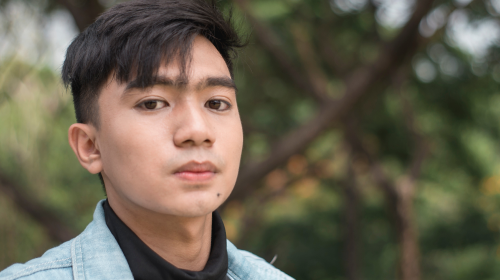
More than 8% of South Carolina teens between the ages of 12 and 17 report past-month drinking.
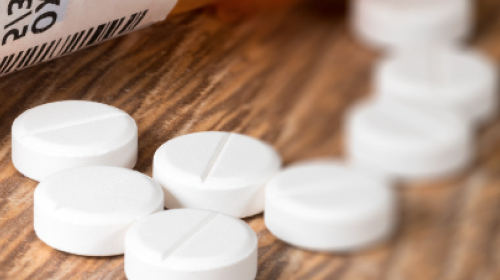
Nearly 2% of South Carolina young adults between 18 and 25 are addicted to opioids.
About 11% of South Carolina young adults are addicted to alcohol.
Nearly 18% of South Carolina young adults have an addiction to drugs or alcohol.
Drug Laws in South Carolina
South Carolina Good Samaritan Law
The South Carolina Good Samaritan law protects a person who assists another in an overdose emergency. The law prevents the helper from being arrested for actions they provide in good faith, such as administering Narcan. The helper must remain at the scene till first responders arrive, and they must cooperate with these professionals. The helper will not be prosecuted for possessing or delivering a controlled substance or possessing drug paraphernalia.
South Carolina Cannabis (Marijuana) Law: Possession
A first-time conviction for possessing marijuana in South Carolina is a class B misdemeanor. It’s punishable by a fine between $100 and $200 or imprisonment for up to 30 days. Second or subsequent marijuana possession convictions are punishable by a fine between $200 and $1,000 and/or imprisonment for one year. Possession of drug paraphernalia is subject to a civil fine up to $500.
South Carolina Cannabis (Marijuana) Law: Possession with Intent to Distribute
Conviction of possession of marijuana with an intent to sell (distribute) in South Carolina results in a fine up to $5,000, plus up to 5 years in prison. A second offense can result in up to 10 years imprisonment and a fine up to $10,000. A third offense results in 5-20 years in prison and a fine up to $20,000.
DUI Law in South Carolina: First Offense
For a first DUI conviction in South Carolina, if your blood alcohol level is less than 0.10%, the punishment is up to 30 days in jail or a fine up to $1,092. This can be exchanged for a minimum of 48 hours of community service. In addition, you must complete an Alcohol and Drug Safety Action Program, buy 3 years of “financial responsibility” insurance, provide state minimum auto insurance coverage, and have an ignition interlock device on your car for 6 months. The DUI conviction is never expungable from your criminal record.
DUI Law in South Carolina: Second Offense
A second DUI conviction in South Carolina can result in punishment of up to one year in jail, and a fine from $2,100 to $5,100, as well as all the other requirements mentioned above for a first offense. The DUI conviction is never expungable from your criminal record.
DUI Law in South Carolina: Refusal to Give a Breath Test
In South Carolina, refusal to take a breath test when stopped for a suspected DUI offense results in the same punishment as outlined above for a first offense DUI conviction. The DUI-related conviction is never expungable from your criminal record.
Resources
- America’s Health Rankings. (2021). Non-Medical Drug Use – Past Year In South Carolina.
- Challenges Inc. (2024). Harm reduction services https://challengesinc.org/ https://challengesinc.org/
- Healthy Connections Medicaid. (2024). Healthy connections is South Carolina’s Medicaid program. https://www.scdhhs.gov/
- Healthy Connections Medicaid. (2024). Updated Department of Alcohol and Other Drug Abuse Services: rate increases.https://www.scdhhs.gov/search?s=substance+abuse+
- U.S. Department of Health and Human Services. (2024). FQHCs by State. https://data.hrsa.gov/data/reports/datagrid?gridName=FQHCs
- U.S. Department of Veterans Affairs (2024).South Carolina: Substance use disorder (SUD) program. https://www.va.gov/directory/guide/state_SUD.cfm?STATE=SC

